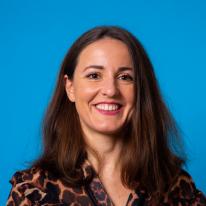Liliana Pasquale
Academic
Liliana is an assistant professor at University College Dublin since June 2016. She received her PhD in Information and Communication Technology from Politecnico di Milano (Italy) in 2011 and was summer intern at IBM TJ Watson Research Center (USA) in 2008.
Her research interests include requirements engineering and adaptive systems. In particular, her work has focused on using runtime requirements models to engineer complex systems, including service compositions and multi-tenant services, cyber-physical systems, mobile device management software and more generally systems aimed to satisfy their security and privacy requirements and to be forensically ready.
Publications
2025
d’Amorim, Marcelo, Hegedűs, Péter, Mirakhorli, Mehdi Tarrit, Okhravi, Hamed, Pasquale, Liliana, Payer, Mathias, Rashid, Awais, Sabetta, Antonino, Santos, Joanna C. S., Spring, Jonathan M., Tan, Lin, Tuma, Katja.
2025.
Challenges to Using Large Language Models in Code Generation and Repair.
IEEE Security & Privacy, 23(2), 81-88.
doi: 10.1109/MSEC.2025.3530488.
Cai, Wanling, Doherty, Gavin, McCarthy, John, Nuseibeh, Bashar, Pasquale, Liliana, Ramkumar, Kushal.
2025.
Diagnosing Unknown Attacks in Smart Homes Using Abductive Reasoning.
IEEE Transactions on Software Engineering, 51(11), 3117-3137.
doi: 10.1109/TSE.2025.3610540.
Alm, Cecilia, Jurcut, Anca, Onwuegbuche, Faithful, Pasquale, Liliana, Rantanen, Esa, Titung, Rajesh.
2025.
Securing the Weakest Link: Exploring Affective States Exploited in Phishing Emails With Large Language Models.
IEEE Access, PP, 1-1.
doi: 10.1109/ACCESS.2025.3615788.
2023
Martinez-Pastor, Beatriz, McCrum, Daniel P., Ntafloukas, Konstantinos, Pasquale, Liliana.
2023.
A Vulnerability Assessment Approach for Transportation Networks Subjected to Cyber–Physical Attacks.
Future Internet, 15, 100.
doi: 10.3390/fi15030100.
Jurcut, Anca Delia, Onwuegbuche, Faithful Chiagoziem, Pasquale, Liliana.
2023.
Enhancing Ransomware Classification with~Multi-stage Feature Selection and~Data Imbalance Correction.
In: Cyber Security, Cryptology, and Machine Learning, Springer Nature Switzerland.
2020
Madhavji, Nazim, Pasquale, Liliana.
2020.
Requirements Engineering: Foundation for Software Quality 26th International Working Conference, REFSQ 2020, Pisa, Italy, March 24{textendash}27, 2020, Proceedings: 26th International Working Conference, REFSQ 2020, Pisa, Italy, March 24{textendash}27, 2020, Proceedings.
doi: 10.1007/978-3-030-44429-7.
Curley, Cliona, Mongiello, Marina, O'Neill, Brian, Pasquale, Liliana, Zippo, Paola.
2020.
Digital Age of Consent and Age Verification: Can They Protect Children.
IEEE Software, 0-0.
doi: 10.1109/MS.2020.3044872.

